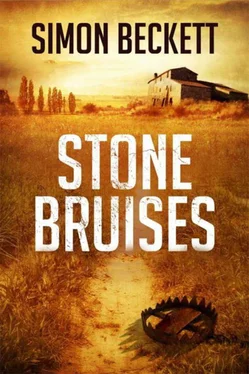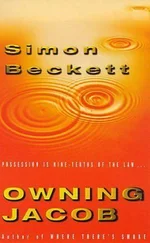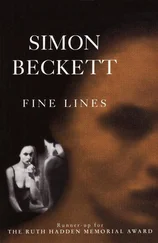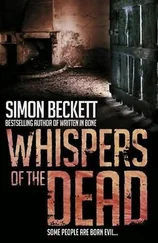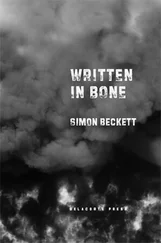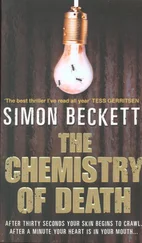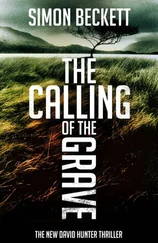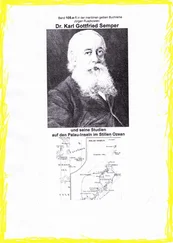I’ve been apprehensive about coming back. Now I’m here, though, I don’t feel very much at all. The changed season and bleak landscape are too different from my memory, robbing the once familiar surroundings of their potency. Seeing them again feels surreal and strange, like revisiting a fever-dream.
In the days after Arnaud put a bullet into his youngest daughter’s heart, I went through my story countless times with the French police. Eventually, once they were satisfied I’d told them everything I knew, I was allowed to return to the UK. I’d given my assurance that I’d return for the trial, which was true as far as it went.
I just didn’t mention that the decision wouldn’t be mine to make.
London seemed grey and dirty after the green lushness of the farm. The world had continued to turn in my absence: the streets still seethed, the traffic still crawled, and the Thames still flowed. My return was momentous only to me. I’d expected to find myself a wanted man, that there would be a warrant out for my arrest at the very least. The reality was less dramatic.
In my guilty imaginings I’d always assumed that the police would know what had happened in Docklands; that I’d killed a man and run away. It never occurred to me that the only person who could tell them might have chosen not to. Rather than draw that sort of attention to himself, Lenny had simply left Jules’s body lying in the gutter, where it lay undiscovered until later that morning. Given the nature of his injuries, it was blamed on a hit and run, and with no evidence or witnesses his death had remained unsolved.
It might have stayed that way if I hadn’t given myself up.
Of course, I knew that wouldn’t be the end of it. There was still the threat of Lenny, and what he might do once he found out I was back. But by now Jules’s former business partner had problems of his own. I learned from a coffee-breathed CID sergeant that the big man was in custody himself after being caught in a drugs raid. Lenny was facing ten years in prison, on charges that included assaulting police officers as well as supplying and distributing class A drugs.
I kept my expression neutral when I heard that.
There was another surprise to come. I’d taken it for granted that I’d be held in custody myself, at least until it was decided what I was going to be charged with. Instead, at the end of the interview I was told I was being released on bail. ‘You came back from France to hand yourself in,’ the CID officer shrugged. ‘I don’t think you’re much of a flight risk.’
For want of anywhere else to go, I headed back to my old flat. I expected to find someone else living there, my belongings long since thrown away. But my keys still worked, and when I let myself in everything was as I’d left it. If not for the dust and accumulated post piled behind the door, I might never have been away. As indifferent to my absence as everything else, the rent had automatically continued to be taken from my bank account, eating up the money I’d been saving to go to France. The irony wasn’t lost on me. Still, it meant I had somewhere to stay until my case came to trial.
There was no point thinking further ahead than that.
And so I stepped back into the husk of my old life. I even returned to my old job at the Zed, after a contrite conversation with Sergei. I needed the money, but it was a bizarre feeling, as though the events of that summer had never happened. That was brought home to me when I bumped into Callum one day.
‘Hey, Sean,’ he said. ‘Not seen you around lately. What’ve you been doing with yourself?’
It dawned on me that he’d no idea I’d even been away. People have their own lives, and it’s vanity to think we play anything other than a bit-part in them.
‘Got your tickets yet for the New Wave season at the Barbican?’ Callum asked.
He looked surprised when I told him I hadn’t even known about it. At one time I would have rushed to book, but now the news left me unmoved. Thinking about it, I realized I’d not been to the cinema or watched a film since my return. It wasn’t even a conscious decision; I’d just had more important things to do.
Chloe would have appreciated that.
My trial was held in a busy courtroom, just one in a long line of proceedings held that day. After all my anxiety it was almost an anticlimax. For a while there was talk of charging me with involuntary manslaughter, but that had been quietly dropped. Jules’s own history of drug dealing and violence, as well as his treatment of Chloe, weighed in my favour. Even the fact that I’d technically stolen his car was considered too much of a grey area to bother with. While it counted against me that I’d fled the country, my lawyer argued that I’d been acting in self-defence and justifiably scared for my life. And if it had taken me longer than it should have to turn myself in… Well, there were extenuating circumstances.
I was found guilty of failing to report an accident and of leaving the scene. The sentence was six months in prison, suspended for two years.
I was a free man.
I stayed in London long enough to hand in my notice and say a few goodbyes, then I left. There was nothing to keep me there, and I still had unfinished business to attend to.
And now here I am.
Slipping a little on the wet cobbles, I go over to the house. The storeroom door is closed. Water drips onto me from the scaffold as I stand outside, suddenly certain that it’ll be locked. But it isn’t: there’s nothing in there anyone would want to steal. The warped door creaks open reluctantly. Inside seems darker than ever, the grey daylight from the courtyard barely illuminating the windowless room. The red overalls are missing, but everything else looks untouched since I left it. I go over to where the bags of sand are stacked. One of them is set a little apart from the others, though not so much that anyone would notice. Putting down my rucksack, I roll up my sleeve and push my hand and arm up to the elbow into the damp sand. I dig around slowly at first, then more urgently when I can’t find anything. I plunge my arm deeper, spilling sand onto the floor. Just when I’m convinced there’s nothing there my fingers encounter something hard. I pull it out.
The plastic-wrapped package looks just as it did when I hid it here, on the afternoon after the gendarmes’ visit. I’d made no mention of it when I’d recounted my story to either the French or UK police, an omission of which I’m not particularly proud. But given everything else I had to tell them it would have been an unnecessary complication. Even if they’d believed I was unaware of what was in the boot of Jules’s car, I’d be hard pressed to explain why I’d kept it.
I’m not sure I know myself.
The storeroom seemed a good hiding place at the time, but I’d not anticipated the package would be left for so long. Since then barely a day has gone by that I haven’t fretted it would be found, that the storeroom would be searched or cleared out. But I needn’t have worried.
Mathilde kept my secret, just as I kept hers.
News of Louis’s murder and Gretchen’s death was met with predictable outrage in the town. But while the facts surrounding the tragedy were soon widely known, the truth behind them was another matter. Before I left the farm to call for the police and an ambulance on the night of the shooting, Mathilde had begged me not to reveal that she was Gretchen’s mother.
‘Promise me!’ she’d insisted, her face etched with grief. ‘Promise me you won’t tell them!’
I hadn’t wanted to listen. I couldn’t see what could be gained by further silence, and the idea of protecting Arnaud was repugnant. But Mathilde clutched my arm, grey eyes burning with intensity.
Читать дальше
